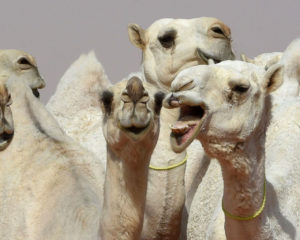 This week: A street sculpture popped up in NYC featuring a guillotine and a (real) dead rat. Judges booted 40 camels out of a beauty pageant in Saudi Arabia because their owners juiced them with Botox. And some 20-somethings created a viral satirical conspiracy theory that Birds Aren’t Real, but not everyone thinks they’re kidding.
This week: A street sculpture popped up in NYC featuring a guillotine and a (real) dead rat. Judges booted 40 camels out of a beauty pageant in Saudi Arabia because their owners juiced them with Botox. And some 20-somethings created a viral satirical conspiracy theory that Birds Aren’t Real, but not everyone thinks they’re kidding.
It’s weird out there, folks.
That’s the good news.
“There is no great art…without a certain strangeness,” John Gardner wrote in his classic On Becoming a Novelist. “One must be capable of cracking the door now and then to the deep craziness of life itself.”
That door, though, can stick, and be hard to budge. (Thanks, middle school cafeteria!) It helps to have a plan.
“I write my first draft, then I go through and do a big revision,” says author Athena Dixon. “And then I go through and do the weird edit.”
The Weird Edit, she says, is dedicated solely to working in thoughts she dismissed as too strange, too tangential. It’s when she gives herself permission to play.
And it pays. In her memoir-in-essays The Incredible Shrinking Woman, Athena interrupts the action to spotlight her scorecard from the kids’ fortune-telling game M.A.S.H. One chapter is a list of reasons to break-up with your lover, while another mashes up classic fairy tales with AOL chatrooms.
The genius of the Weird Edit is, it says to the writer’s inner middle-schooler, “Be yourself! Nobody’s looking.”
You can also try Gotham teacher N. West Moss’s approach: Talking to your inner critic directly.
“I actually had a conversation in my head with the negative editor,” West says. “It went something like this: “Hey. I know you have a lot to say right now, but if I let you in too early you will kill my writing. So go stand in the corner.’ ”
Clearly, the critic obeyed, because in her memoir Flesh & Blood, she clears a chair for the ghost of her dead grandmother. She imagines what might grow in place of her uterus. One supporting character is a praying mantis named Claude.
The M.A.S.H. and mash-ups in Athena’s book, and Claude in West’s, are delightful and surprising, but they are also essential. Because their books are about the most universal of themes — love, heartbreak, and identity; illness, loss and recovery.
What makes them lasting, what makes them great (and they are great) is the strange.
Your turn: Close your eyes and summon the most recent thing you almost wrote into your story, but then backed off. Open a fresh page, and write it.
Go, do it now.
But first, tell your inner censor to sit quietly in the corner for awhile, because this is your weird edit.

Kelly Caldwell
Dean of Faculty


